Letter Writer: Do you have any resources for a birth parent who has both parented and placed children? I know of a situation where the birth mother has an open adoption but she has never included the children she is parenting in the visits with the child she placed.
Now the parented children are 8, 10, and 15. How does she tell them they have a surprise sibling? As much as I’ve searched, I can’t seem to find such a resource to help her figure out if and how to come clean.
— Shanna
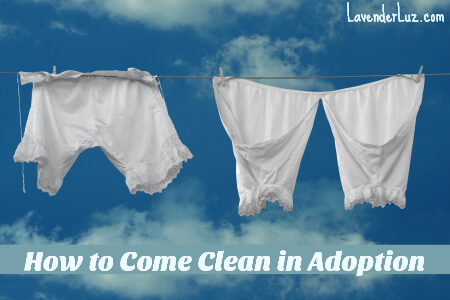
~~~~~
Hi, Shanna. It’s helpful that you are wanting to find resources for your friend to come clean about her children having a surprise sibling. I wrote my own thoughts on the issue, but I figured it would be beneficial to also ask someone who (1) has the experience of being a first/birth mother, and (2) has training and practice as a psychotherapist. Please welcome…
Guest Advisor Leslie Pate MacKinnon, LCSW
Leslie MacKinnon‘s adoption experience includes placing two sons in closed adoptions. (To see just how much grit Leslie has, I highly HIGHLY encourage you to read this article.) Leslie’s story is included in the book The Girls Who Went Away and in the documentary A Girl Like Her, both by Ann Fessler. She’s been on Good Morning America with Robin Roberts, and on CNN discussing the impact of the internet on adoption.
Dear Shanna

I don’t know of any particular book or article on the topic, although there may be one. But having dealt with this a zillion times, I do have a response.
Just as is suggested to adoptive parents, start talking about the adoption piece before infants/toddlers can even understand. That makes it easier to follow through as they grow. I told my twins about their older brothers in between pre-school and kindergarten, since I realized (due to other bits of personal family info) it was likely to become a public topic.
However, now that this mom is where she is, here is the way I might word it: Since I knew you’d want to talk amongst yourselves, I waited until you all were old enough to understand. I’m telling you now because our “baby” is now 8.
Obviously, it’s not a good idea to follow this with now don’t tell anyone else. Secrecy implies shame, and though we birth mothers do carry a lot of that particular commodity, it’s our job to put it down long enough so as not to burden our raised or relinquished children with shame.
Be prepared, because at least one of them may want to make contact immediately. I’m guessing the adoptee in question could be a young adult by now and it’s important to inquire if he/she is ready to include their half siblings. Perhaps the mom can find out the placed child’s preferences and boundaries before having the conversation with the parented children.
Relationships amongst sibs are usually easy and free of heavy feelings. However, the older ones may be angry that they were not told before. Sorry, but it happens sometimes. If so, let them make the first contact when it’s time to do so.
My 2 cents
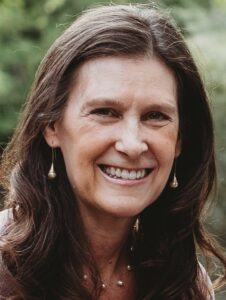
Leslie has given some great advice about jump-starting these sibling connections and coming clean. I have a few things to say, too.
A Failed Experiment
We are sometimes afraid of the truth because of the way we structured adoption in the post-WWII years. Due to the shame and secrecy surrounding adoption during that time period, we created lies and walls to make one family disappear and elevate the other.
But there’s nothing magical or right about the Closed Adoption Era. It was merely a failed experiment. Now we are trying to find better ways to “do” adoption, ones that don’t involve shame, secrecy, and lies.
Just like adoptive parents should never hide the truth from their children, neither should birth parents. Trust is a fundamental ingredient in a relationship, and the parent/child relationship the most foundational one. The trust between parent and child (or lack thereof) will affect all other relationships that son/daughter will ever have.
We need to stop being afraid of the truth, and we must become able to share important information in a sensitive and age-appropriate way.
But how to deliver that truth now?
Coming Clean about a Surprise Sibling
Many adoption professionals now counsel adoptive parents to start telling the child their story early, as Leslie advises — maybe even on the way home. In the earliest days of adoptive parenting, it’s less about the baby hearing the story than it is about you getting comfortable telling the story.
The same principle holds with birth parents. Tell your child from the beginning. Normalize your story by being able to talk about it comfortably — at least by the time your parented child is old enough to understand. Use those early pre-verbal years to iron out your telling of the story.
For those who have waited to tell, here’s how you might start the normalization process:
Parents need some basic ingredients to parent: they need to provide a safe place, some safe grownups around them, and they need to be mostly grown-up themselves. I wasn’t in a position to parent a few years ago, so when I found out I was going to have a baby, I had to make sure my baby had parents who were ready now. (Pause.)
That baby — your brother who is now 17 years old — has parents named Beth and Tom and is living in a town about an hour from here. He is a member of their family, and he’s part of our family, too. (Pause).
This is a pretty big deal and I imagine you have some questions for me. (Pause).
Some Worries May Arise
Your children may wonder if you will ever place them if you lose any of these basic parenting ingredients. Whether they express this or not, assure them that you are a grown-up now, and you’ve got things under control. (This is important. Our kids need to know we can provide predictability for their world.) Under no circumstances will they need to have other parents. You are theirs forever.
You may also need to reassure them that no one will ever take their places in your heart. Remind them that love multiplies, not divides. That there is room for them to love you and their other parent (or another adult they love). Likewise, you have infinite love to go around for them and this new-found sibling.
Circumstances may vary among families integrating information about surprise siblings, but 3 basic principles of these conversations remain: be honest, be inclusive (we are family and they are family), and be reassuring.
Dear Readers: what advice do you have for Shanna to pass on?
See Also
- A Broken Open Adoption; A Reunion | a birth mom integrates her parented daughters and her placed daughter
- I Know Something I’m Not Supposed to About My Child’s Birth Mom | Truth always has a way of coming out
- Complexity in an Open Adoption | when parenting issues overlap with adoption issues
About this Open Advice Column
- I am not a therapist. Please do not rely on words in this space to make your own major or minor decisions.
- Readers, please weigh in thoughtfully and respectfully. This is a teaching endeavor, not a shaming endeavor. We we aim to bring light rather than heat. People do the best they can with what they have to work with, and our goal is to give folks more to work with.
- Send in your own open adoption question for consideration.
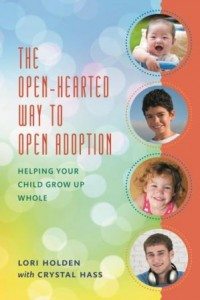
Lori Holden, mom of a young adult daughter and a young adult son, writes from Denver. She was honored as an Angel in Adoption® by the Congressional Coalition on Adoption Institute.
Her first book, The Open-Hearted Way to Open Adoption: Helping Your Child Grow Up Whole, makes a thoughtful anytime gift for the adoptive families in your life. Her second book, Standing Room Only: How to Be THAT Yoga Teacher is now available in paperback, and her third book, Adoption Unfiltered, is now available through your favorite bookseller!
Find Lori’s books on her Amazon Author page and catch episodes of Adoption: The Long View wherever you get your podcasts.

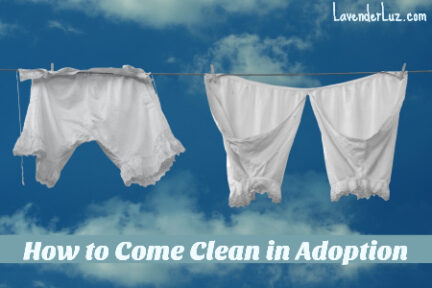
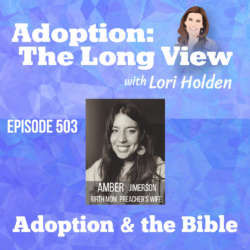
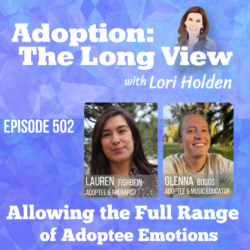
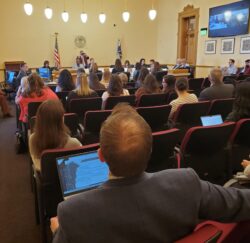
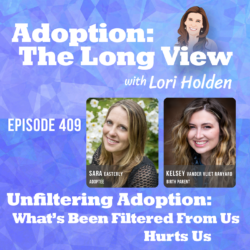

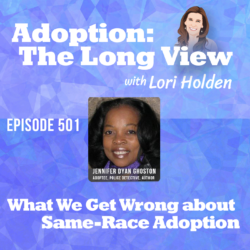

8 Responses
Such a sticky situation, and you and Leslie handle discussing it with such grace and empathy. I loved this about the previous thoughts on adoption truthtelling: ” it’s less about the baby hearing the story than it is about you getting comfortable telling the story.” I love the emphasis on truth and transparency and question-answering and avoiding (as much as you can) the idea of shame, secrecy, and lies.
No advice, but this is such a stressful situation. I think your advice IS the best one can do: “3 basic principles of these conversations remain: be honest, be inclusive (we are family and they are family), and be reassuring.”
I so appreciate your wisdom on these subjects (& that of your friends), Lori! My aunt gave up a baby for adoption before she was married. I did not know this until I was in high school/university, & my mother let it slip in a dinner table conversation. My aunt went on to get married a few years later & have three other children (now all in their 40s). We have no idea if she has told them about their older half-brother. (I suspect not, although I could be wrong.) I have often wondered about this cousin I’ve never met, who would be about 50 now… I’ve been thinking about having my DNA analyzed for genealogy purposes, but the existence of this cousin and the possibility of having him contact me — and the pain & upheaval that might cause my aunt & her family — is one reason I’ve been hesitant to do it so far. Openness can be painful (especially when it comes to revealing long-held family secrets), but in the long run, I think it’s far less complicated!
I probably used some old-fashioned/inappropriate language here… apologies!
No worries! We all have many decades of “put up” and “gave up” — vestiges from the orphan trains when children were literally put up on a platform as they stopped at stations while traveling west on the rails.
Adoption done right should be with more power in the hands of the mom and with more intention. In my work with Family to Family Support Network, we help nurses replace those outdated terms with the more updated “placed.”
It’s understandable it if takes awhile to make the switch!
Secrets create so much mess! And others (like you) often have to navigate it.
Openness is complicated, for sure. But at least it deals in truth and not lies.
I love the phrase – Love doesn’t divide, it multiplies! i absolutely love that ! I agree with most of what you said. Honesty especially is important. I met my birth mother about 5 years ago. She had 3 daughters after I was adopted. She had never told them. The oldest daughter, she’s only 11 months younger than me, refuses to met me. She was the very upset. So, I can see how the oldest sibling may have the most issue with the situation. I hope everything works out for the best for all involved.
Secrecy — anything that grows out of the seeds of shame, really — really does a number on people, doesn’t it? I’m sorry your mother’s daughter is struggling to incorporate this new reality. I wish for you all acceptance and resolution as time passes.